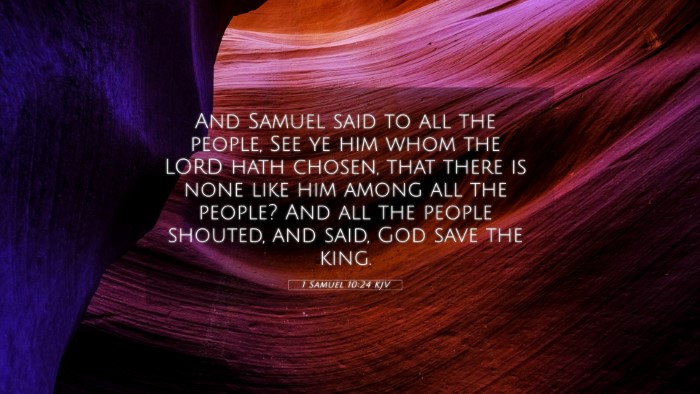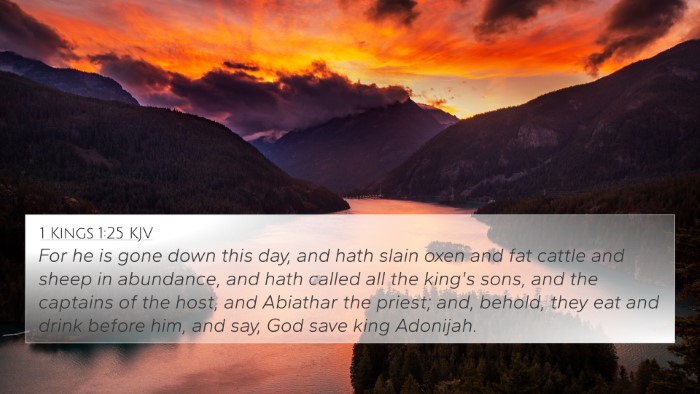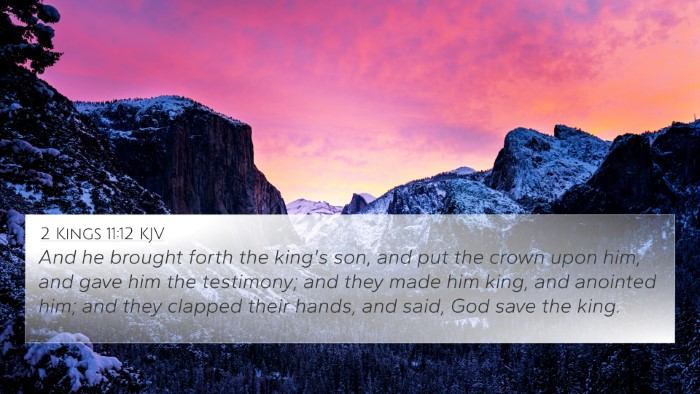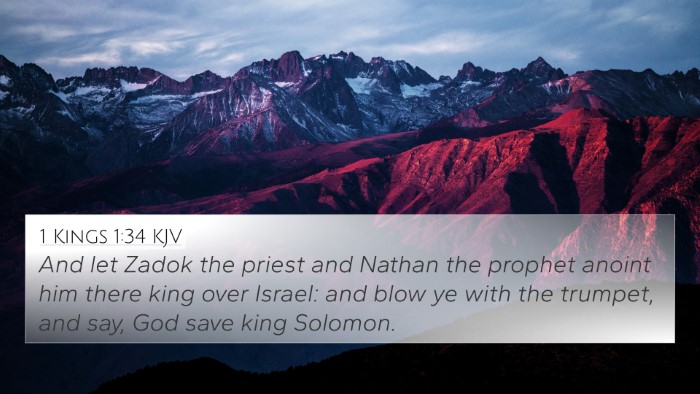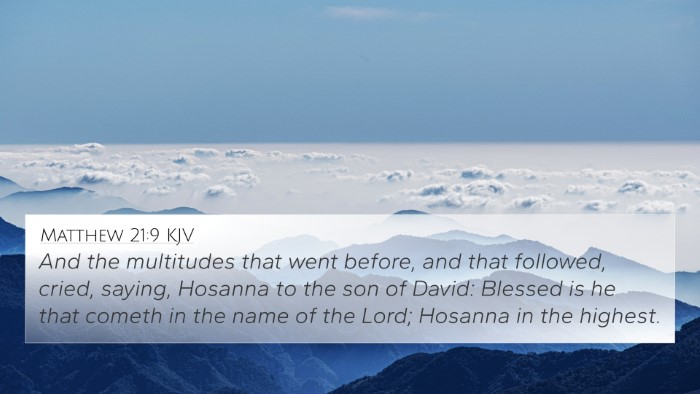1 Samuel 10:24 states, "And Samuel said to all the people, 'Do you see him whom the Lord has chosen? There is none like him among all the people.' And all the people shouted, 'Long live the king!'"
This verse marks a significant moment in Israel's history when Saul is publicly anointed as king. The people's reaction emphasizes their acceptance of Saul’s leadership, showcasing a pivotal shift in Israel's governance.
Meaning and Interpretation
According to Matthew Henry, this passage highlights God's sovereignty in choosing leaders. Samuel points out Saul as God’s selection, underlining the importance of divine choice in authority. Henry notes that the people's acclaim for Saul reflects their desire for a tangible leader, transitioning away from the judge-led governance that had characterized their society.
Albert Barnes elaborates on the significance of the phrase “none like him.” Barnes indicates that Saul’s physical stature and demeanor were noteworthy; however, he warns that such external qualities do not ensure internal qualifications for kingship. The excitement of the crowd serves as a reminder of their need for a leader, even amid potential pitfalls of relying solely on outward appearances.
Adam Clarke emphasizes the communal aspect of Saul’s selection. The word ‘king’ is significant, marking a departure from the previous theocratic system. Clarke draws attention to how this moment of national celebration foreshadows the challenges and tumultuous events that would follow under Saul’s reign, as he later becomes a controversial figure in the Biblical narrative.
Cross-References to Consider
- Deuteronomy 17:15: "You shall set a king over you whom the Lord your God will choose." This verse establishes a precedent for divine selection of kings.
- 1 Samuel 8:5: "And said to him, 'Behold, you are old, and your sons do not walk in your ways; now appoint for us a king to judge us like all the nations.'" This illustrates the people's desire for a king, framing the context for Saul's appointment.
- 1 Samuel 9:2: "And he had a son whose name was Saul, a handsome young man. There was not a man among the people of Israel more handsome than he." This verse highlights Saul’s appealing traits.
- 1 Chronicles 10:1: "Now the Philistines fought against Israel; and the men of Israel fled before the Philistines and fell slain on Mount Gilboa." This context shows the strategic challenges Saul faced as king.
- Romans 13:1: "Let every person be subject to the governing authorities. For there is no authority except from God, and those that exist have been instituted by God." This emphasizes the theological perspective that all authority is ordained by God.
- Philippians 2:3-4: "Do nothing from selfish ambition or conceit, but in humility count others more significant than yourselves." This offers a contrast to the impending leadership style of Saul.
- Hebrews 13:7: "Remember your leaders, those who spoke to you the word of God. Consider the outcome of their way of life, and imitate their faith." This encourages reflection on the qualities of spiritual leadership, relevant to understanding the choice of Saul.
- Acts 13:21: "Then they asked for a king, and God gave them Saul the son of Kish, a man of the tribe of Benjamin, for forty years." This gives an apostolic perspective on the selection of Saul as king.
- 1 Samuel 15:26: "And Samuel said to Saul, 'I will not return with you, for you have rejected the word of the Lord, and the Lord has rejected you from being king over Israel.'" This foreshadows the challenges of Saul’s reign and the consequences of disobedience.
- Proverbs 21:1: "The king's heart is a stream of water in the hand of the Lord; he turns it wherever he will." This verse emphasizes God's ultimate control over rulers.
Concluding Thoughts
The selection of Saul as king in 1 Samuel 10:24 provides a rich tapestry of theological, historical, and practical implications. From the public reaction to God's choice of leadership, this moment serves as a foundation for understanding the complexities of Israel's governance, the expectations of kingship, and the inherent challenges faced by leaders.
For those engaged in Bible cross-referencing, this verse is pivotal in connecting various themes across the Scriptures, revealing deeper insights into the nature of leadership in a divine context. Through comparative Bible verse analysis, one can discern the multifaceted relationship between God and His appointed leaders, shaping a greater understanding of His sovereignty and the responsibility of human authority.

